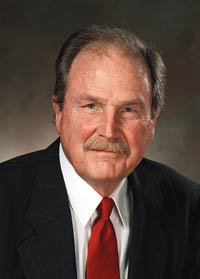![[Currents header graphic]](/homeart/currents_header.gif)
![[Currents header graphic]](/homeart/currents_header.gif)
May 17, 1999
By Tim Stephens
David Huffman, professor emeritus of computer science, has been awarded the 1999 Richard W. Hamming Medal from the Institute of Electrical and Electronics Engineers (IEEE). The IEEE will honor Huffman for "design procedures of minimum redundancy (Huffman) codes and asynchronous sequential circuits" and for "contributions to analysis of visual imagery" at the annual IEEE honors ceremony on June 12 in London.

|
|
David Huffman Photo: Don Harris |
The Hamming Medal, established in 1986, recognizes exceptional contributions to information sciences and systems. It is sponsored by Lucent Technologies and includes a gold medal and a cash honorarium.
Huffman is probably best known for the development of the Huffman Coding Procedure, the result of a term paper he wrote while a graduate student at the Massachusetts Institute of Technology. "Huffman Codes" are present in nearly every application that requires efficient use of binary digits in the digital representation of data, such as data storage and retrieval systems, modems, fax machines, and high-definition television.
Huffman has made contributions in a number of distinctly different areas, including information theory and coding, signal designs for radar and communications applications, determination of theoretical limitations of and design procedures for asynchronous logical circuits, and the efficient representation of surfaces. As an outgrowth of his work on the mathematical properties of "zero curvature" surfaces, Huffman developed his own techniques for folding paper into unusual sculptured shapes.
He joined the faculty at MIT in 1953 and was named professor in 1962. Huffman came to UCSC in 1967 as the founding faculty member of the Computer Science Department. He played a major role in the development of the department's academic programs and the hiring of its faculty, and served as chair from 1970 to 1973. He retired in 1994, but remains active as an emeritus professor and continues teaching information theory and signal analysis courses.
"When David Huffman came to UC Santa Cruz, his personal reputation gave instant credibility to the computer science program he started," said Patrick Mantey, dean of UCSC's Baskin School of Engineering.
Huffman is a fellow of the IEEE and recipient of many honors, including the Louis E. Levy Medal of the Franklin Institute for his doctoral thesis on sequential switching circuits, a Distinguished Alumnus Award from Ohio State University, and the W. Wallace McDowell Award. He also is a charter recipient of the Computer Pioneer Award from the IEEE Computer Society. In 1998, he received a Golden Jubilee Award for Technological Innovation from the IEEE Information Theory Society.
Huffman earned his B.S. and M.S. degrees from Ohio State University and his Ph.D. from MIT, all in electrical engineering. He also served in the U.S. Navy as a radar maintenance officer on a destroyer.
The IEEE is the world's largest technical professional society, with more than 335,000 members in approximately 150 countries. Through its members, the IEEE is a leading authority on areas ranging from aerospace, computers, and telecommunications to biomedicine, electric power, and consumer electronics.